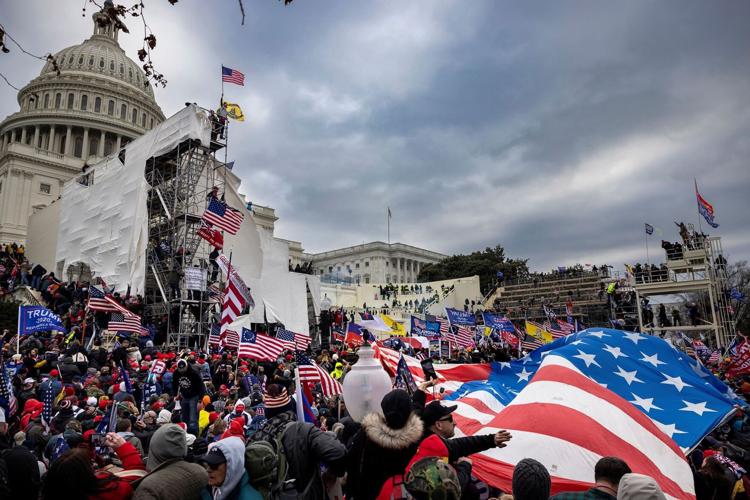(CNN) � President Donald Trump is planning to pardon people convicted of nonviolent offenses related to the January 6, 2021, US Capitol attack and to commute the sentences of others convicted of more serious offenses, according to multiple sources familiar with the plan.
The Justice Department also is expected to move in court to dismiss cases that have not yet gone to trial, several sources told CNN.
Trump has not yet signed an executive order but is expected to do so Monday.
More than 730 people have been convicted of misdemeanor offenses in connection with January 6, according to the latest Justice Department estimates. Further, there are about 300 prosecutions still pending in court as of Monday, including many accused of violent felony crimes, such as assaulting police.
Trump has long to pardon at least some of his supporters who stormed the US Capitol on January 6, 2021, disrupting the peaceful transfer of power.
More than 140 police officers were during the , which also led directly and indirectly to the deaths of four Trump supporters in the mob and five police officers.
After the attack, the Justice Department and FBI launched a nationwide manhunt to identify and arrest rioters, which turned into the biggest criminal probe in US history. Prosecutors charged more than 1,580 people and secured roughly 1,270 convictions.
About 55% of January 6 prosecutions are misdemeanor cases, with charges like disorderly conduct or trespassing, according to Justice Department data. For those convicted, the vast majority were sentenced to probation or a few months in prison and were already released.
Some defendants are who got caught up in the frenzy. Others went inside the Capitol for a handful of minutes but or vandalized anything. Most have no criminal record. A large chunk of the people in the mob said they never intended to infiltrate the Capitol, let alone disrupt Congress� certification of the 2020 election results. Some believe they were by police.
Yet, Trump has also January 6 “a day of love and peace� and his supporters posed “zero threat.� These false claims are belied by hundreds of video clips of Trump supporters police with , , and , deploying and , and in with police officers.
The brother of US Capitol Police Officer , who died one day after being assaulted during the insurrection, condemned Trump’s plan to pardon many of the rioters.
Craig Sicknick recently urged supporters of a liberal advocacy group to sign a petition opposing the pardons, saying it will allow the rioters to “evade responsibility� and that “it’s just plain wrong,� according to a copy of the email obtained by CNN.
“Donald Trump and his loyalists not only celebrate the deadly mob that killed my brother � they are determined to pardon those responsible,� Craig Sicknick said in the message. “It is a betrayal to not only the families and loved ones of those who were injured and killed but to all Americans.�
Monday, Republican Sen. Mike Rounds said he remembers January 6 well and “there was violence. This was this was not peaceful. People were in harm’s way, and it was a very, very bad day for America.�
The South Dakota senator added that he acknowledged the president has the authority to issue pardons and he respects that “constitutionally,� but emphasized, “right now we’re looking forward.�
Pardons vs. commutations
Pardons don’t erase a defendant’s criminal record and don’t overturn a conviction. Any January 6 rioters who pleaded guilty or were found guilty at trial are still convicted criminals.
But a pardon forgives the offense and restores the recipient’s civil rights, like gun ownership or voting rights. For convicted rioters on probation, a pardon will end their probation early.
Presidents also have the power to commute sentences of people convicted of federal crimes. For instance, a president can reduce or eliminate someone’s prison sentence, which could pave the way for incarcerated January 6 rioters to be freed from custody.
Unlike a pardon, a commutation does not forgive the crime and does not restore the recipient’s civil rights. Similar to pardons, a commutation does not erase a conviction.
US attorney Matthew Graves, a Biden appointee who oversaw the prosecution of the rioters, last week condemned any possible pardons but said nothing will erase the events of 2021.
“A pardon does not wipe away what occurred,� .
Americans oppose January 6 pardons
Most Americans oppose these pardons, according to recent polls on the topic that were conducted before Trump took office. Independents are also firmly against pardons for January 6 rioters � but they are very popular among Republicans, according to the data.
One found 59% of adults oppose pardoning people who “forced their way into the Capitol.� Two found 66% and 62% opposition to pardoning anyone “convicted� in the attack on the Capitol. A from Quinnipiac University found 59% of registered voters oppose pardoning anyone who was “convicted and jailed� in connection with January 6.
But a large swath of Trump’s base supports clemency. The Quinnipiac that asked about pardons for already “convicted and jailed� found solid GOP support at 67%.
This story has been updated with additional developments.
CNN’s Manu Raju contributed to this report.
The-CNN-Wire
� & © 2025 Cable News Network, Inc., a Warner Bros. Discovery Company. All rights reserved.
















